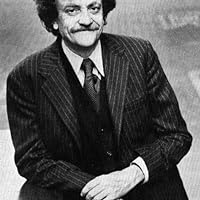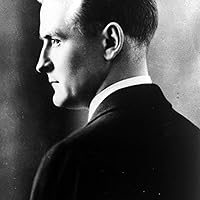Media Quotes
Quotes tagged as "media"
Showing 1,231-1,260 of 1,263

“Voting, we might even say, is the next to last refuge of the politically impotent. The last refuge is, of course, giving your opinion to a pollster, who will get a version of it through a desiccated question, and then will submerge it in a Niagara of similar opinions, and convert them into--what else?--another piece of news. Thus we have here a great loop of impotence: The news elicits from you a variety of opinions about which you can do nothing except to offer them as more news, about which you can do nothing.”
― Amusing Ourselves to Death: Public Discourse in the Age of Show Business
― Amusing Ourselves to Death: Public Discourse in the Age of Show Business

“Because we lack a divine Center our need for security has led us into an insane attachment to things. We really must understand that the lust for affluence in contemporary society is psychotic. It is psychotic because it has completely lost touch with reality. We crave things we neither need nor enjoy. 'We buy things we do not want to impress people we do not like'. Where planned obsolescence leaves off, psychological obsolescence takes over. We are made to feel ashamed to wear clothes or drive cars until they are worn out. The mass media have convinced us that to be out of step with fashion is to be out of step with reality. It is time we awaken to the fact that conformity to a sick society is to be sick. Until we see how unbalanced our culture has become at this point, we will not be able to deal with the mammon spirit within ourselves nor will we desire Christian simplicity.”
― Celebration of Discipline: The Path to Spiritual Growth
― Celebration of Discipline: The Path to Spiritual Growth

“the media are not the holders of power, but they constitute by and large the space where power is decided.”
― Communication Power
― Communication Power

“Yet, the main issue is not the shaping of the minds by explicit messages in the media, but the absence of a given content in the media.”
― Communication Power
― Communication Power

“In their eyes, Eve saw the wolf gleam. The story was the prey, ratings the trophy.”
― Glory in Death
― Glory in Death

“There hasn't been a scandal this big at the C.I.A. since (CLASSIFIED) committed (CENSORED) to (REDACTED).”
―
―
“People are tired of this mainstream shit; television and radio is ghastly and the public can smell the corporate meeting. When you watch a show with Simon Cowell, you know no human touch has been near it, that they've carefully engineered the outcome and picked those they're going to humiliate. We live in an age of information glut, but so many people don't question what they're spoon-fed or bother to search for themselves.”
―
―

“As always, imagine how great the press corps would be if it devoted 1/1000th the energy to dissecting non-sex political wrongdoing”
―
―

“When every single piece of media you consume is time-shifted, does that mean it's actually you that's time-shifted?”
― Mr. Penumbra's 24-Hour Bookstore
― Mr. Penumbra's 24-Hour Bookstore

“He was looking for programs on which he might be allowed to appear. But it was too early in the evening for programs that allowed people with peculiar opinions to speak out. It was only a little after eight o'clock, so all the shows were about silliness or murder.”
― Slaughterhouse-Five
― Slaughterhouse-Five

“Once someone tries a real extra virgin -- an adult or a child, anybody with taste buds -- they'll never go back to the fake kind. It's distinctive, complex, the freshest thing you've ever eaten. It makes you realize how rotten the other stuff is, literally rotten. But there has to be a first time. Somehow we have to get those first drops of real extra virgin oil into their mouths, to break them free from the habituation to bad oil, and from the brainwashing of advertising. There has to be some good oil left in the world for people to taste.”
― Extra Virginity: The Sublime and Scandalous World of Olive Oil
― Extra Virginity: The Sublime and Scandalous World of Olive Oil
“The news media are, for the most part, the bringers of bad news… and it’s not entirely the media’s fault, bad news gets higher ratings and sells more papers than good news.”
―
―

“I turned on Fox News and jumped when I saw that they had one of those things in their studio. "Are you people crazy?" I screamed at the television. "Get out of there. Somebody shoot it!" Then I realized I was watching Special Report and had mistaken Charles Krauthammer for a zombie.”
― Zombie Apocalypse 2012: A Political Horror Story
― Zombie Apocalypse 2012: A Political Horror Story
“Objectivity, in this sense, means that a person's statements about the world can be trusted if they are submitted to established rules deemed legitimate by a professional community. Facts here are not aspects of the world, but consensually validated statements about it.”
― Discovering The News: A Social History Of American Newspapers
― Discovering The News: A Social History Of American Newspapers
“Albert Camus did not know he was summing up modern photojournalism when he wrote:"Will I kill myself or have a cup of coffee”
―
―

“The main problem with mass media is that it makes it impossible to fall in love with any acumen of normalcy. There is no 'normal' because everybody is being twisted by the same sources simultaneously.”
― Sex, Drugs, and Cocoa Puffs: A Low Culture Manifesto
― Sex, Drugs, and Cocoa Puffs: A Low Culture Manifesto
“Look at the language. If a scientist delivers the simple, unconditional, absolutely certain statements that politicians and journalists want, he is talking as an activist, not a scientist.”
― The Science of Fear: Why We Fear the Things We Shouldn't--and Put Ourselves in Greater Danger
― The Science of Fear: Why We Fear the Things We Shouldn't--and Put Ourselves in Greater Danger
“Because we live in a democracy, and the people can't govern themselves well if they don't know the truth about the world we live in. What if our rich citizens never hear of the poverty and suffering of the rest of the city? Why should they ever give to charity or vote for reform?”
― Lovelier Than Daylight
― Lovelier Than Daylight
“Ritual abuse diagnosis research – excerpt from a chapter in: Lacter, E. & Lehman, K. (2008).Guidelines to Differential Diagnosis between Schizophrenia and Ritual Abuse/Mind Control Traumatic Stress. In J.R. Noblitt & P. Perskin(Eds.), Ritual Abuse in the Twenty-first Century: Psychological, Forensic, Social and Political Considerations, pp. 85-154. Bandon, Oregon: Robert D. Reed Publishers. quotes: A second study revealed that these results were unrelated to patients’ degree of media and hospital milieu exposure to the subject of Satanic ritual abuse. “In fact, less media exposure was associated with production of more Satanic content in patients reporting ritual abuse, evidence that reports of ritual abuse are not primarily the product of exposure contagion.” Responses are consistent with the devastating and pervasive abuse these victims have experienced, so often including immediate family members.”
― Ritual Abuse in the Twenty-First Century: Psychological, Forensic, Social, and Political Considerations
― Ritual Abuse in the Twenty-First Century: Psychological, Forensic, Social, and Political Considerations

“I'm an unabashed elitist. Everyone needs a good editor, and there is peril in worshiping amateurism and the unedited in science, art, and journalism.”
―
―

“All thought usually reached the public after thirty years in some such form: The man on the street heard the conclusions of some dead genius through someone else's clever paradoxes and didactic epigrams.”
― This Side of Paradise
― This Side of Paradise
“But into the first decades of the twentieth century, even at the New York Times, it was uncommon for journalists to see a sharp divide between facts and values. Yet the belief in objectivity is just this: the belief that one can and should separate facts from values. Facts, in this view, are assertions about the world open to independent validation. They stand beyond the distorting influences of any individual's personal preferences. Values, in this view, are an individual's conscious or unconscious preferences for what the world should be; they are seen as ultimately subjective and so without legitimate claim on other people. The belief in objectivity is a faith in "facts," a distrust of "values," and a commitment to their segregation.”
― Discovering The News: A Social History Of American Newspapers
― Discovering The News: A Social History Of American Newspapers
“Objectivity is a peculiar demand to make of institutions which, as business corporations, are dedicated first of all to economic survival. It is a peculiar demand to make of institutions which often, by tradition or explicit credo, are political organs. It is a peculiar demand to make of editors and reporters who have none of the professional apparatus which, for doctors or lawyers or scientists, is supposed to guarantee objectivity.”
― Discovering The News: A Social History Of American Newspapers
― Discovering The News: A Social History Of American Newspapers
“It should be apparent that the belief in objectivity in journalism, as in other professions, is not just a claim about what kind of knowledge is reliable. It is also a moral philosophy, a declaration of what kind of thinking one should engage in, in making moral decisions. It is, moreover, a political commitment, for it provides a guide to what groups one should acknowledge as relevant audiences for judging one's own thoughts and acts.”
― Discovering The News: A Social History Of American Newspapers
― Discovering The News: A Social History Of American Newspapers

“Some readers were aware that the novels they loved amounted to a propaganda campaign, that the love stories had a particular agenda that might or might not have anything at all to do with reality. But then as now, being a canny and independent-minded consumer of popular media did not bar one from also enjoying being manipulated by it.”
― Straight: The Surprisingly Short History Of Heterosexuality
― Straight: The Surprisingly Short History Of Heterosexuality

“Here we introduce the nation's first great communications monopolist, whose reign provides history's first lesson in the power and peril of concentrated control over the flow of information. Western Union's man was one Rutherford B. Hates, an obscure Ohio politician described by a contemporary journalist as "a third rate nonentity." But the firm and its partner newswire, the Associated Press, wanted Hayes in office, for several reasons. Hayes was a close friend of William Henry Smith, a former politician who was now the key political operator at the Associated Press. More generally, since the Civil War, the Republican Party and the telegraph industry had enjoyed a special relationship, in part because much of what were eventually Western Union's lines were built by the Union Army.
So making Hayes president was the goal, but how was the telegram in Reid's hand key to achieving it?
The media and communications industries are regularly accused of trying to influence politics, but what went on in the 1870s was of a wholly different order from anything we could imagine today. At the time, Western Union was the exclusive owner of the nationwide telegraph network, and the sizable Associated Press was the unique source for "instant" national or European news. (It's later competitor, the United Press, which would be founded on the U.S. Post Office's new telegraph lines, did not yet exist.) The Associated Press took advantage of its economies of scale to produce millions of lines of copy a year and, apart from local news, its product was the mainstay of many American newspapers.
With the common law notion of "common carriage" deemed inapplicable, and the latter day concept of "net neutrality" not yet imagined, Western Union carried Associated Press reports exclusively. Working closely with the Republican Party and avowedly Republican papers like The New York Times (the ideal of an unbiased press would not be established for some time, and the minting of the Time's liberal bona fides would take longer still), they did what they could to throw the election to Hayes. It was easy: the AP ran story after story about what an honest man Hayes was, what a good governor he had been, or just whatever he happened to be doing that day. It omitted any scandals related to Hayes, and it declined to run positive stories about his rivals (James Blaine in the primary, Samuel Tilden in the general). But beyond routine favoritism, late that Election Day Western Union offered the Hayes campaign a secret weapon that would come to light only much later.
Hayes, far from being the front-runner, had gained the Republican nomination only on the seventh ballot. But as the polls closed his persistence appeared a waste of time, for Tilden, the Democrat, held a clear advantage in the popular vote (by a margin of over 250,000) and seemed headed for victory according to most early returns; by some accounts Hayes privately conceded defeat. But late that night, Reid, the New York Times editor, alerted the Republican Party that the Democrats, despite extensive intimidation of Republican supporters, remained unsure of their victory in the South. The GOP sent some telegrams of its own to the Republican governors in the South with special instructions for manipulating state electoral commissions. As a result the Hayes campaign abruptly claimed victory, resulting in an electoral dispute that would make Bush v. Gore seem a garden party. After a few brutal months, the Democrats relented, allowing Hayes the presidency — in exchange, most historians believe, for the removal of federal troops from the South, effectively ending Reconstruction.
The full history of the 1876 election is complex, and the power of th”
―
So making Hayes president was the goal, but how was the telegram in Reid's hand key to achieving it?
The media and communications industries are regularly accused of trying to influence politics, but what went on in the 1870s was of a wholly different order from anything we could imagine today. At the time, Western Union was the exclusive owner of the nationwide telegraph network, and the sizable Associated Press was the unique source for "instant" national or European news. (It's later competitor, the United Press, which would be founded on the U.S. Post Office's new telegraph lines, did not yet exist.) The Associated Press took advantage of its economies of scale to produce millions of lines of copy a year and, apart from local news, its product was the mainstay of many American newspapers.
With the common law notion of "common carriage" deemed inapplicable, and the latter day concept of "net neutrality" not yet imagined, Western Union carried Associated Press reports exclusively. Working closely with the Republican Party and avowedly Republican papers like The New York Times (the ideal of an unbiased press would not be established for some time, and the minting of the Time's liberal bona fides would take longer still), they did what they could to throw the election to Hayes. It was easy: the AP ran story after story about what an honest man Hayes was, what a good governor he had been, or just whatever he happened to be doing that day. It omitted any scandals related to Hayes, and it declined to run positive stories about his rivals (James Blaine in the primary, Samuel Tilden in the general). But beyond routine favoritism, late that Election Day Western Union offered the Hayes campaign a secret weapon that would come to light only much later.
Hayes, far from being the front-runner, had gained the Republican nomination only on the seventh ballot. But as the polls closed his persistence appeared a waste of time, for Tilden, the Democrat, held a clear advantage in the popular vote (by a margin of over 250,000) and seemed headed for victory according to most early returns; by some accounts Hayes privately conceded defeat. But late that night, Reid, the New York Times editor, alerted the Republican Party that the Democrats, despite extensive intimidation of Republican supporters, remained unsure of their victory in the South. The GOP sent some telegrams of its own to the Republican governors in the South with special instructions for manipulating state electoral commissions. As a result the Hayes campaign abruptly claimed victory, resulting in an electoral dispute that would make Bush v. Gore seem a garden party. After a few brutal months, the Democrats relented, allowing Hayes the presidency — in exchange, most historians believe, for the removal of federal troops from the South, effectively ending Reconstruction.
The full history of the 1876 election is complex, and the power of th”
―
“We are attempting to build, within our movement, non-exploitative ways of relating to one another based on trust and concern rather than political expediency. We have serious personal/political intentions in breaking down hierarchical and elitist structures, and for experimenting with leaderless groups and collective decision making. In dealing with the media these revolutionary principles and practices are destroyed. The media works to create leaders, it knows no way of relating to us on our own terms. Being interviewed and presented as a leader is a real ego trip--the media brings out the most counter-revolutionary traits in people. Elitism, dissension and division are the ultimate results.”
―
―
All Quotes
|
My Quotes
|
Add A Quote
Browse By Tag
- Love Quotes 97k
- Life Quotes 75.5k
- Inspirational Quotes 72.5k
- Humor Quotes 43.5k
- Philosophy Quotes 29.5k
- Inspirational Quotes Quotes 27k
- God Quotes 26k
- Truth Quotes 23.5k
- Wisdom Quotes 23.5k
- Romance Quotes 23k
- Poetry Quotes 22k
- Death Quotes 20k
- Happiness Quotes 18.5k
- Life Lessons Quotes 18.5k
- Hope Quotes 18k
- Faith Quotes 18k
- Quotes Quotes 16.5k
- Inspiration Quotes 16.5k
- Spirituality Quotes 15k
- Religion Quotes 15k
- Motivational Quotes 15k
- Writing Quotes 14.5k
- Relationships Quotes 14.5k
- Life Quotes Quotes 14k
- Love Quotes Quotes 13.5k
- Success Quotes 13.5k
- Time Quotes 12.5k
- Motivation Quotes 12k
- Science Quotes 11.5k
- Knowledge Quotes 11k




